The Artura’s powertrain grabs headlines, but it’s so much more than a pricey plug-in hybrid supercar
16 hours ago
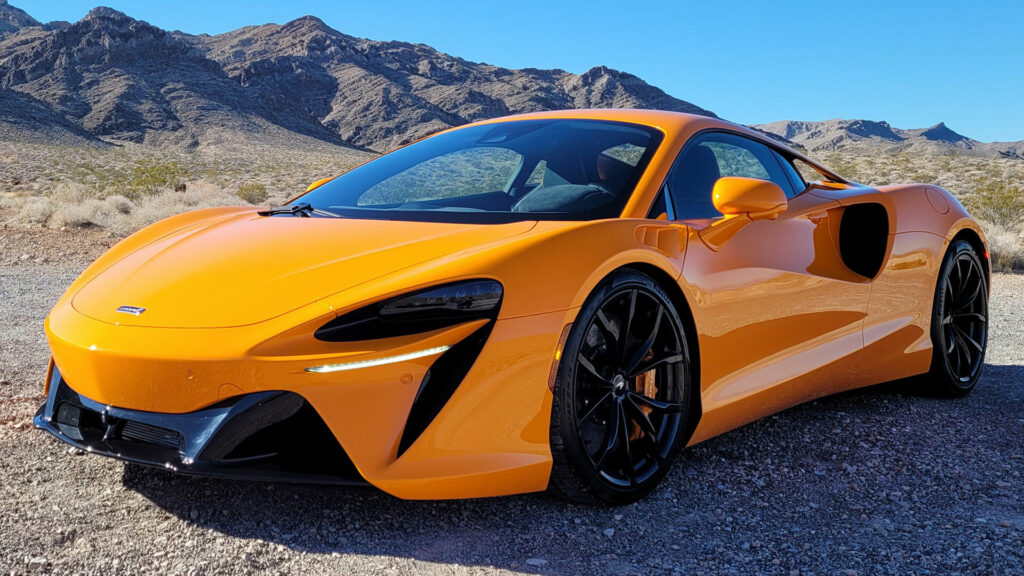
by Michael Gauthier
The effects of climate change can be seen throughout the American southwest, but the striking visuals of Lake Mead really put things into perspective.
This summer, NASA’s Earth Observatory noted water levels fell to their lowest point since 1937, when the reservoir was being filled for the first time. The dramatic drop is etched into the rock as a white line marks where the water level used to be.
The change hasn’t gone unnoticed and automakers are embracing a cleaner, greener, and electrified future. This includes McLaren, which introduced their first plug-in hybrid a decade ago. While the P1 went out of production in 2015, its spirit lives on in the new Artura, which is the company’s first series-production high-performance hybrid supercar.
Combining distinctive styling with an innovative new plug-in hybrid powertrain, the Artura is an everyday supercar that is lightning quick and surprisingly comfortable. The model also hasn’t forgotten the company’s lightweight focus as it tips the scales at a mere 3,303 lbs (1,498 kg). That’s an impressive figure for any car, let alone a plug-in hybrid.
A Sporty And Purposeful Design
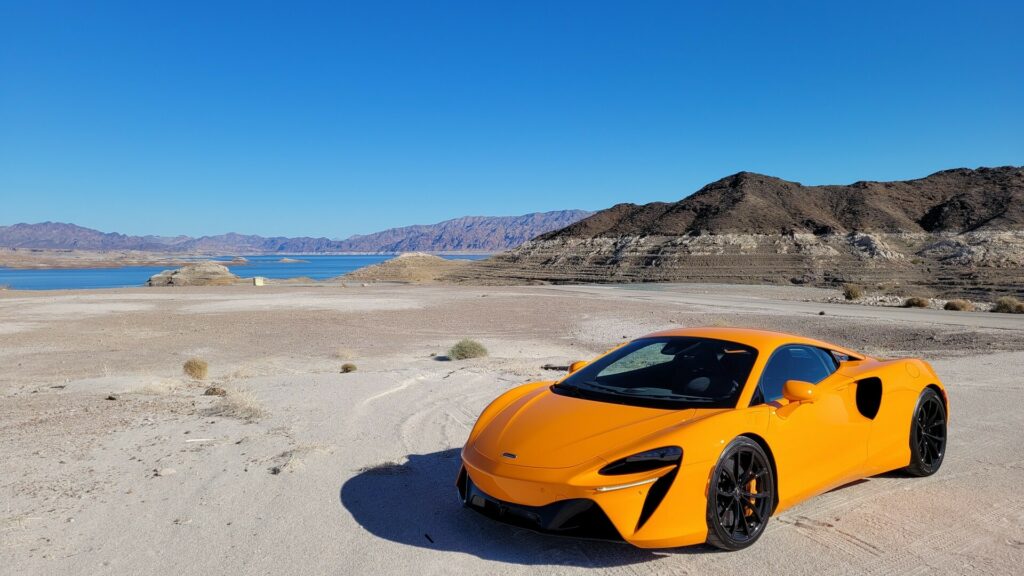
| FAST FACTS |
|---|
| MSRP: $237,500 (including destination) |
| Combined Output: 671 hp and 531 lb-ft of torque |
| 0-60 MPH Time: 3.0 seconds |
| Top Speed: 205 mph |
| Electric-Only Range: 11 miles |
| On Sale: Now |
Supercars are supposed to stand out and the Artura doesn’t disappoint as it features an aggressive and unmistakable design. The company bills the model as a “technical sculpture” with “functional jewelry,” and it looks like a natural evolution of the 570S.
advertisement scroll to continue
However, the model isn’t a 570S successor as that car was a member of the Sport Series whereas the Artura is part of the company’s supercar lineup. As a result, it slots between the GT and 720S.
Similarities aside, the model has a shark nose front fascia with recessed headlights and LED daytime running lights. They’re joined by a prominent front splitter and sizable intakes.
Moving down the sides, there’s aluminum dihedral doors and a single-piece aluminum roof that flows into flying buttresses. They’re joined by “superformed” aluminum body panels and front fender vents that reduce pressure in the wheel arches, while also guiding ‘dirty’ air away from the side intakes. In fact, McLaren says “each vent, duct and fold – and even the door mirrors – has a specific purpose in managing airflow, cooling radiators, optimizing downforce, and enabling onboard technology.”
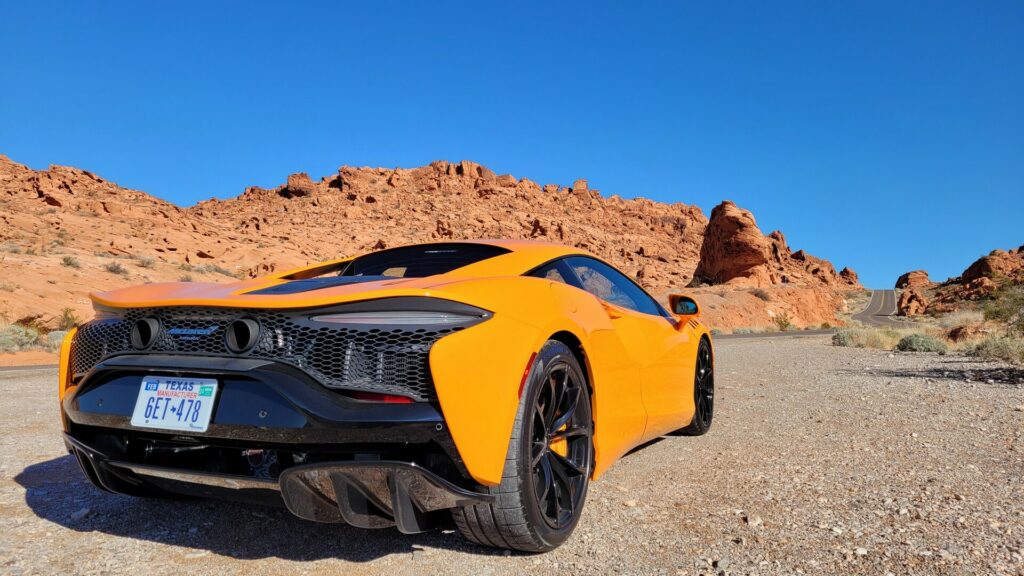
That brings us to the rear end, which is pure supercar as it sports a mesh fascia with an integrated dual exhaust system. They’re joined by slender LEDs that function as taillights, brake lights, and indicators. It’s also impossible to ignore the car’s sizable diffuser, which indicates the Artura means business.
The car rides on 19- and 20-inch forged alloy wheels, which cover black aluminum calipers with white McLaren logos. However, if black isn’t your color, six other hues are available.
The brake calipers are just the tip of the customization iceberg as McLaren offers an assortment of styling options. The most notable is the MSO Carbon Fiber Pack, which adds a number of carbon fiber components including a front splitter, diffuser, rear bumper, and mirror caps.
A Minimalist, But Surprisingly Spacious Cabin
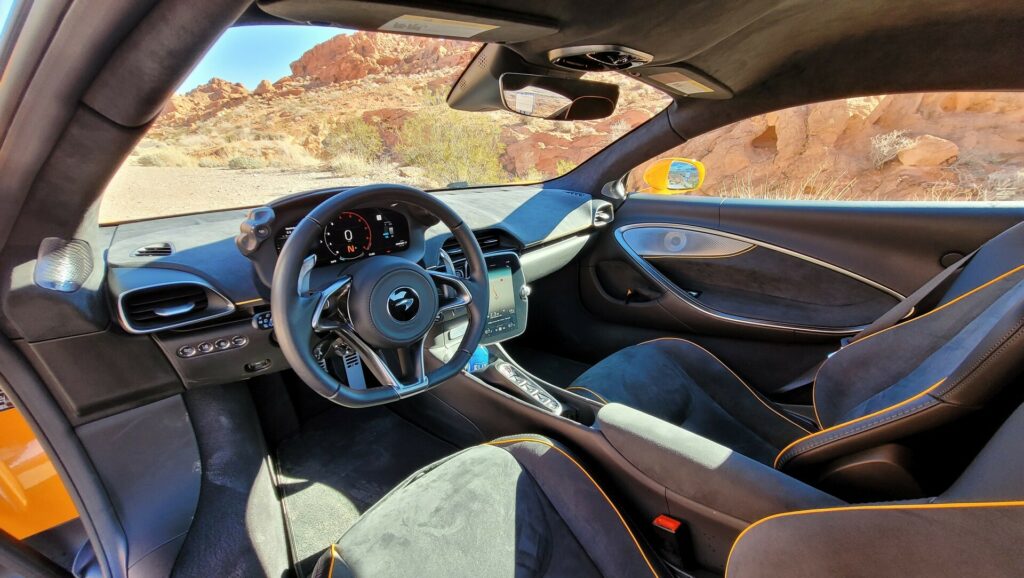
If you’ve ever wondered how old and fat you’ve become, try getting into a supercar. While the dihedral doors open easy enough, getting inside the Artura is another story as it required this 6’ 2” reviewer to move the driver’s seat back and then raise the power steering wheel to its maximum height. Even then, entry and egress wasn’t a pretty picture although it wasn’t a complete disaster either.
Once inside, things get significantly better as the cabin is surprisingly spacious and airy. Visibility is excellent and there’s tons of head- and legroom, although the cabin is narrow and the driver’s side footwell is pretty tight.
Our tester came in well-equipped Performance trim, which sees Alcantara upholstery cover the seats, headliner, doors, and dashboard. Other surfaces sport Nappa leather and there’s orange piping for a splash of color. Speaking of the latter, the Performance, TechLux, and Vision trims come standard with a 12-color ambient lighting system.
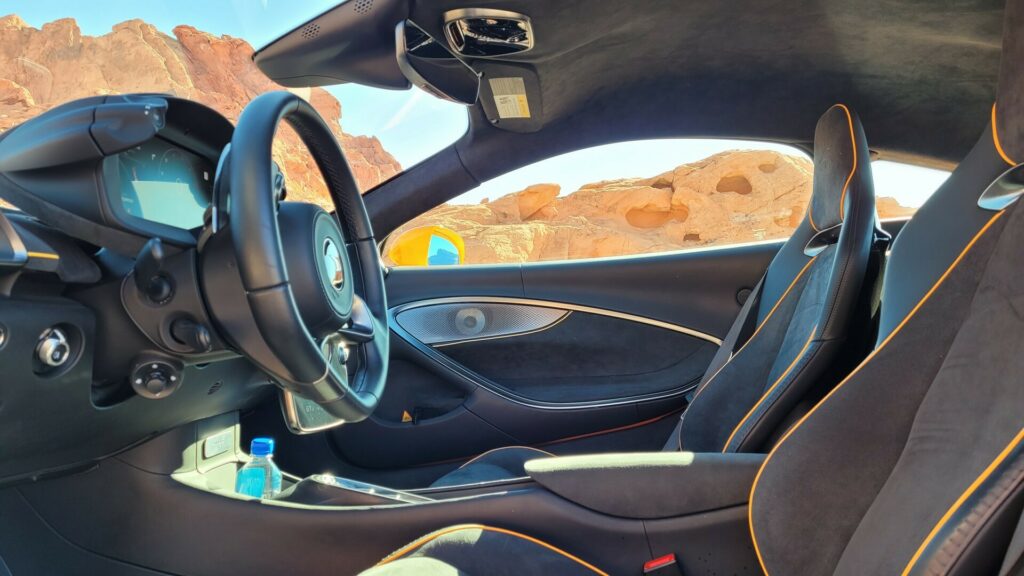
On the topic of equipment, our car was outfitted with the Technology Pack that features a 12-speaker Bowers & Wilkins audio system with a subwoofer integrated into the front of the carbon fiber monocoque. The package also includes advanced driver assistance systems, which is a first for McLaren. While the list is relatively brief, customers will find Intelligent Adaptive Cruise Control, Road Sign Recognition technology, Lane Departure Warning, and a 360° Park Assist system.
Last but not least, there’s the Practicality Pack, which adds power-folding heated door mirrors, front/rear parking sensors, a rearview camera, soft-close doors, and HomeLink. However, the most notable feature is a vehicle lift system, which raises the nose of the car so you don’t accidently scrape the front splitter when encountering speed bumps or steep entrances.
Besides the aforementioned equipment, the Artura has a 10-inch digital instrument cluster that is mounted on top of the steering column so the two move in unison. The display is bright and informative without feeling cluttered. It also changes based on the selected driving mode as putting the car in Track mode will show a horizontal tachometer for improved visibility.
Also: McLaren Artura Debuts A 671 HP Plug-in Hybrid Supercar With No Reverse Gear
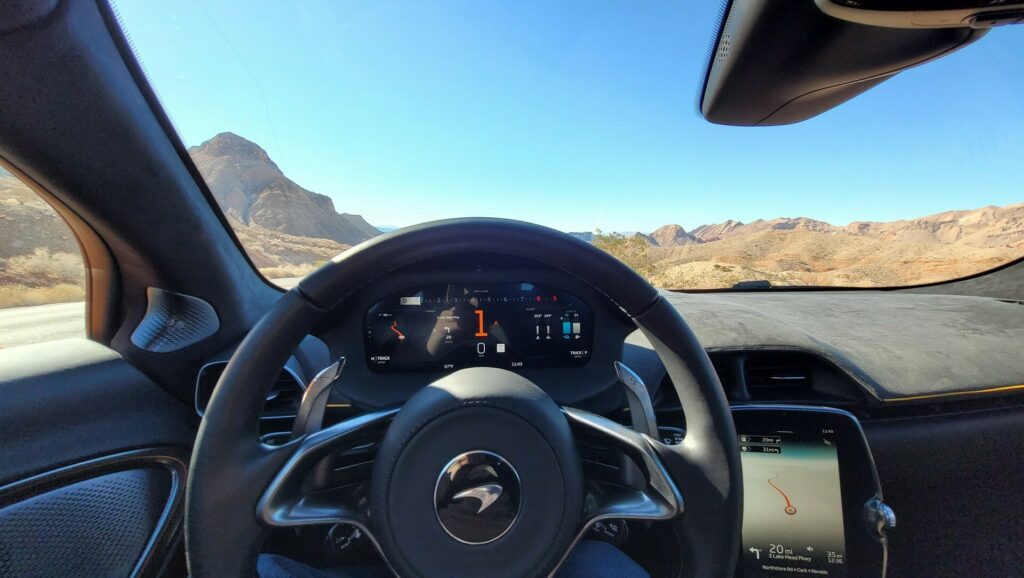
Sticking with screens, there’s an 8-inch Android-based infotainment system with a portrait orientation. While the screen is small, it features massive bezels that make it feel a little dated.
Thankfully, the same can’t be said about the system itself as it’s reasonably quick and features dedicated climate controls that always remain visible. The system feels a little basic, but the dial is an interesting touch as it functions as a menu button and a volume controller.
Supercars have a tendency to be quirky and the Artura has a number of odd design choices. The shifter is key among them as it only has Drive, Neutral, and Reverse settings. Park is curiously absent, but the car will automatically go into park if you shut the engine off. If you’d rather keep the engine running, you’ll have to fumble around for the parking brake which is mounted low on the dashboard.
Another quirk is the lack of steering wheel mounted switchgear. Instead, there are four stalks with the lower two controlling the voice assistant and the adaptive cruise control system. The latter takes a little getting used to, but it becomes pretty natural once you get the hang of it.
On the bright side, the flat-bottom steering wheel is perfectly sized and features paddle shifters that feel great. Elsewhere, there are stylish metal accents as well as comfortable and supportive seats. Unfortunately, some of the plastics feel a little on the cheap side.
A 671 HP Plug-In Hybrid Powertrain With 11 Miles Of Electric-Only Range
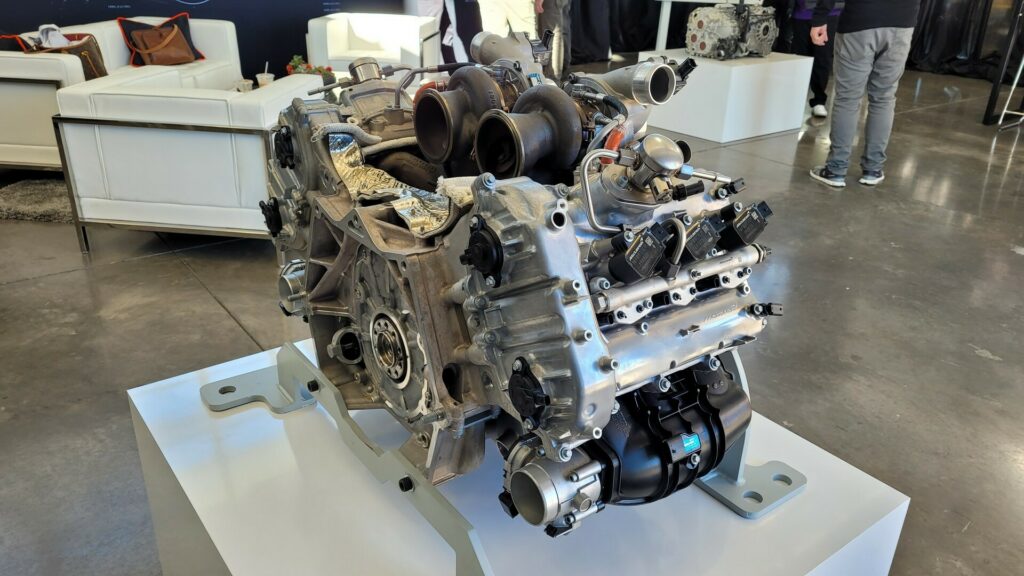
The undisputed star is the Artura’s plug-in hybrid powertrain, which features an all-new twin-turbo 3.0-liter V6 with a 120˚ ‘hot vee’ configuration. The latter optimizes performance and emissions, while also enabling the engine to be impressively compact and lightweight. The engine tips the scales at 353 lbs (160 kg), which makes it 110 lbs (49.9 kg) lighter than the company’s 4.0-liter V8.
That’s only part of the story as the M630 features continuously variable valve timing, a dry-sump lubrication system, and a direct injection system operating at 350 bar. The engine screams to 8,500 rpm, while also sporting symmetrical turbochargers and electronically actuated wastegates.
The engine produces 577 hp (430 kW / 585 PS) and 431 lb-ft (584 Nm) of torque, and it’s joined by an axial flux electric motor which is roughly the size of a brake disc and weighs a mere 34 lbs (15.4 kg). Despite its small size, the electric motor punches above its weight as it develops up to 94 hp (70 kW / 95 PS) and 166 lb-ft (225 Nm) of torque.
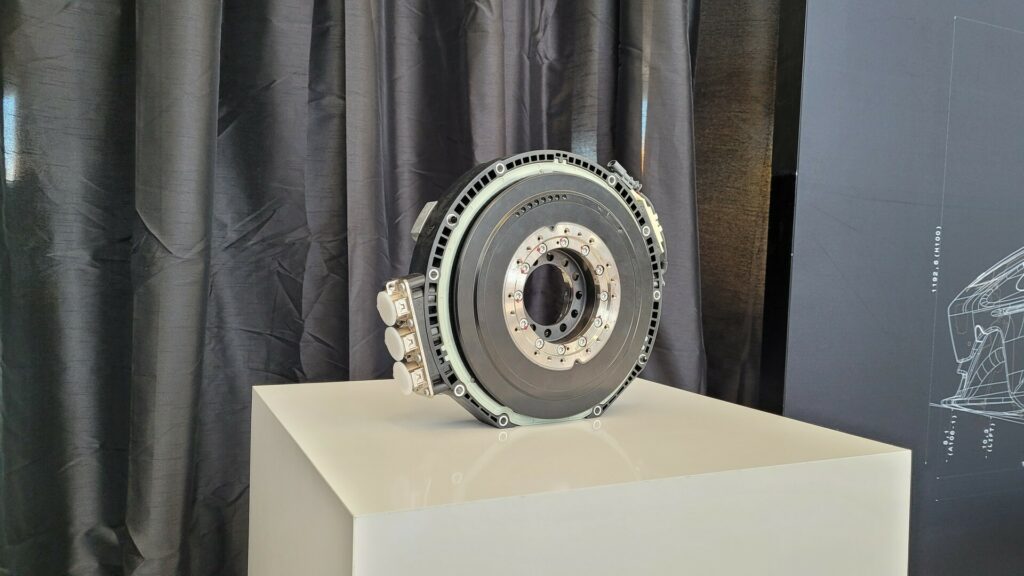
The motor is integrated into the Artura’s eight-speed dual-clutch transmission and it’s powered by a lithium-ion battery pack that has a usable capacity of 7.4 kWh. This setup enables the model to travel 11 miles (17.7 km) on electricity alone at speeds up to 81 mph (130 km/h).
The electric-only range is pretty short, but the battery can be given an 80% charge in approximately two and a half hours. Owners also don’t have to worry about electrical upgrades as the EVSE cable plugs into a standard household outlet.
More importantly, the engine and electric motor can work together to give the Artura a combined output of 671 hp (500 kW / 680 PS) and 531 lb-ft (719 Nm) of torque. This enables the car to rocket from 0-62 mph (0-100 km/h) in three seconds flat, while 124 mph (200 km/h) arrives 5.3 seconds later. If drivers keep their foot planted, they’ll eventually top out at 205 mph (330 km/h).
Those numbers fall short of the 720S, which has a twin-turbo 4.0-liter V8 developing 710 hp (530 kW / 720 PS) and 568 lb-ft (770 Nm) of torque. Thanks to the extra oomph, the Artura’s counterpart can hit 62 mph (100 km/h) in 2.9 seconds and top out at 212 mph (341 km/h). While the 720S has a slight edge, the plug-in hybrid is a relative bargain as it offer similar performance for tens of thousands of dollars less.
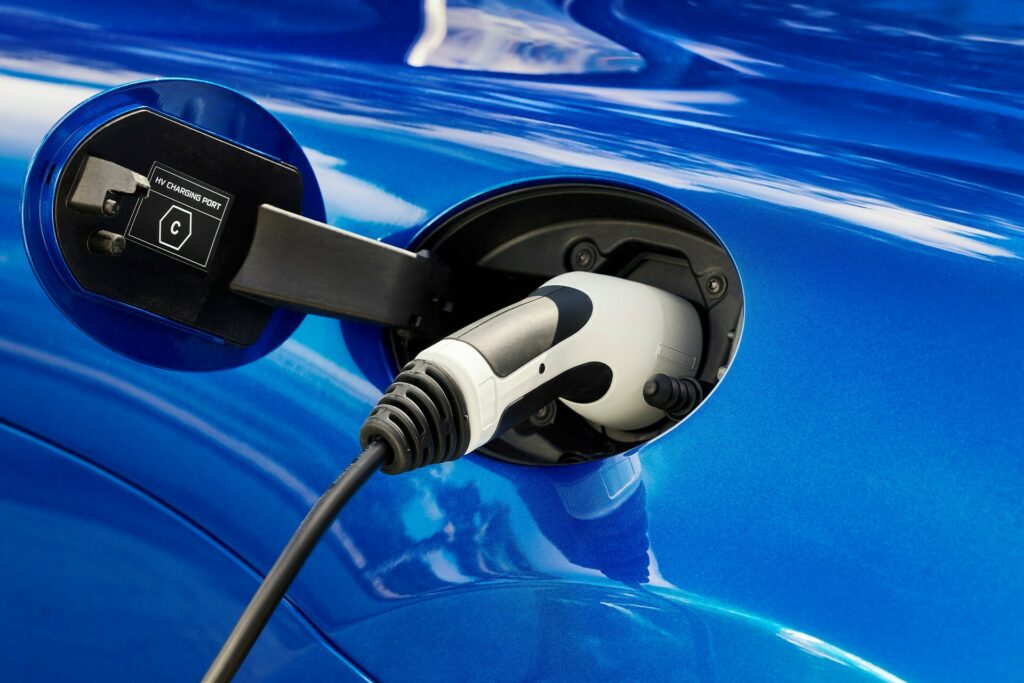
Picture credit: McLaren
So how does everything work in practice? Amazingly well as the Artura is impressively quick and sounds reasonably good even though it eschews the company’s familiar V8.
After hitting the start button, the Artura quietly comes to life as E-Mode is the default driving mode. It enables owners to quietly leave their home, without disturbing anyone, and cruise around with zero emissions. The car is nearly silent outside, but there’s a hum in the cabin and a little bit of road noise.
A quick push of the selector puts you into Comfort mode, which is focused on efficiency. As a result, the engine shuts off at low speeds and the transmission shifts at lower revs to maximize fuel efficiency.
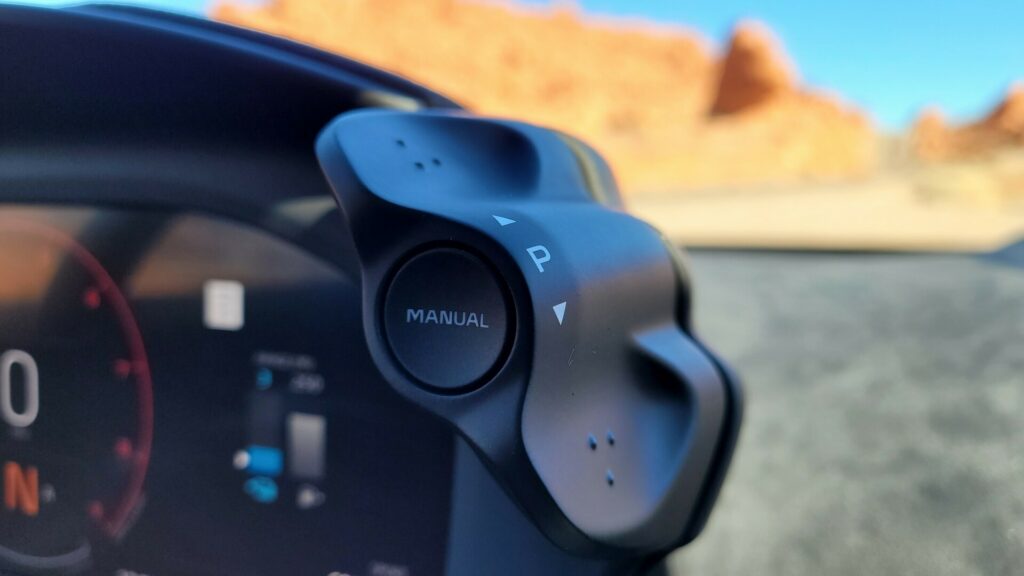
Sport mode provides a more interesting driving experience as the engine is always active and ready to respond to the slightest press of the accelerator. The shift logic also changes to hold gears until the car gets into the mid-rpm range.
Track mode builds on that by delivering faster shifts, shifting at higher revs, and maximizing regeneration to ensure there is always plenty of battery power. The latter is notable because in Sport and Track modes, the powertrain has a “torque infill” feature which uses the electric motor to deliver improved low-end response.
Mash the accelerator from a standstill and you’ll be impressed by the results as the electric motor provides instantaneous torque for a rapid launch. You’ll quickly build up speed and continue accelerating as the engine then does the heavy lifting. All of this occurs in perfect harmony and you’ll soon find yourselves hitting triple digits if you don’t lift off the go pedal.
A Proper Supercar With A Lightweight Focus
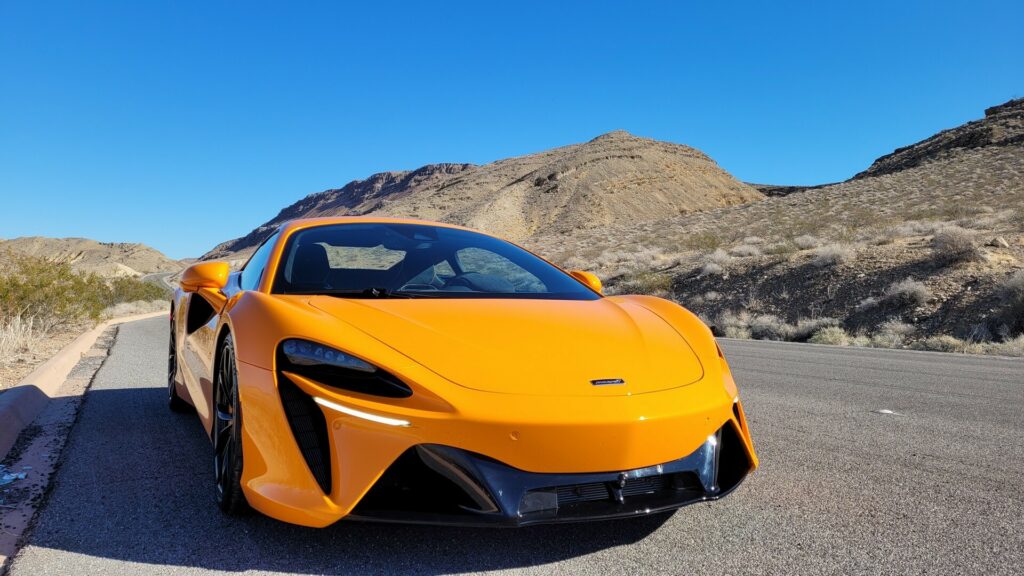
The phenomenal performance is matched by a standout driving experience as the Artura can seemingly defy the laws of physics. Of course, this isn’t magic, but rather dedication to making the car as light as possible.
This starts from the ground up as the Artura rides on the all-new McLaren Carbon Lightweight Architecture, which is built at the company’s new Composites Technology Center in Sheffield. It consists of three main elements including an all-new carbon fiber monocoque that features a new structural core material as well as a new resin system.
This enables the carbon fiber structure to weigh a mere 181 lbs (82.1 kg) including the battery compartment. Speaking of the latter, the total weight of the hybrid components – including the battery and electric motor – is just 287 lbs (130.2 kg). That’s part of the reason why the Artura boasts a class-leading power-to-weight ratio of 481 hp (358 kW / 487 PS) per ton.
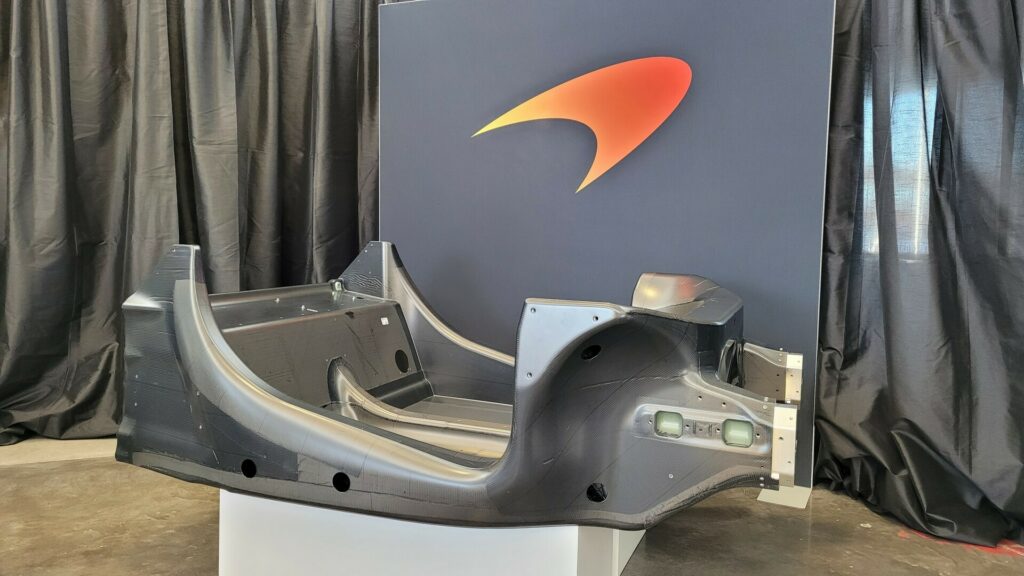
While we could talk about weight saving measures for much, much longer, the effort pays big dividends as the Artura handles beautifully. One of my biggest concerns coming into the car was that the plug-in hybrid system’s weight would dilute the driving experience. That’s not the case as handling is spot on and you never get the sensation that there’s a heavy battery pack on board, even when pushing hard on the track. That’s a remarkable achievement and one that shows it’s possible to have your cake and eat it too.
The story doesn’t end there as the Artura has a handling mode selector with Comfort, Sport, and Track settings. Each has separate adjustments for damper firmness and customers can also adjust the electronic stability control system as it has On, Dynamic, and Off settings.
If that wasn’t enough handling goodies, the Artura is the first McLaren to have an electronically controlled differential. It’s integrated into the eight-speed transmission and helps to optimize traction when accelerating out of corners.
Last but not least, there’s a Variable Drift Control system that enables drivers to select how much fun they want to have. The system offers 15 different settings, so drivers can progressively explore the car’s limits.
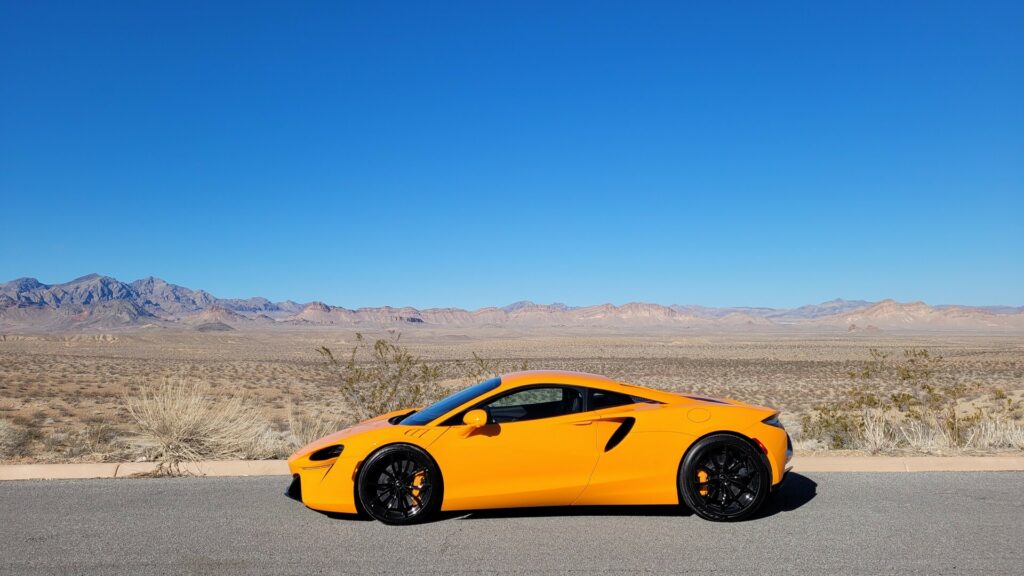
While many plug-in hybrids have regenerative braking systems, the Artura doesn’t as the engine provides sufficient charging and the company wanted a ‘proper’ brake pedal feel. The latter is also why the car uses a mechanical setup instead of newer brake-by-wire technology. Engineers also installed a bespoke brake booster and an electrically driven vacuum pump to ensure pedal pressures remain consistent, regardless of whether the car is running on the internal combustion engine or the electric motor.
As for the brakes themselves, McLaren outfits the Artura with carbon ceramic discs that measure 15.4 inches (391 mm) front and 15 inches (381 mm) rear. They’re backed up by forged aluminum calipers, which have six pistons at the front and four out back.
The brakes provide plenty of stopping power and they had no problem quickly dissipating speed from 130+ mph (209 km/h) runs on the straight at Las Vegas Motor Speedway. Even more impressively, the brakes showed little sign of fading even after 30 laps.
While it’s no surprise the brakes performed well on the track, they also work good on the street. After an initial learning curve, they’re easy to modulate and there weren’t any hints of grabbiness or undue noise.
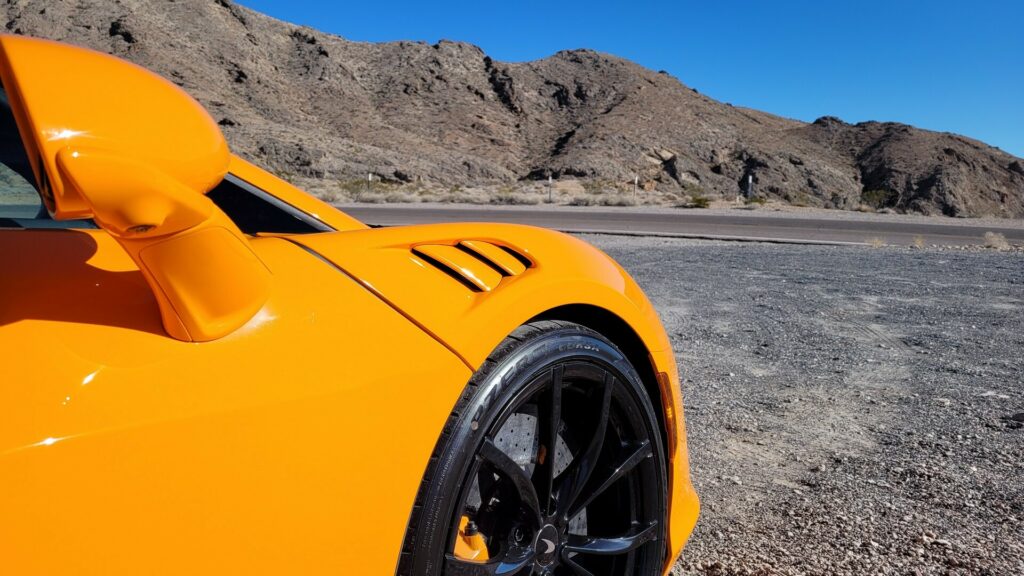
Steering is spot-on thanks to a hydraulically-assisted setup that provides plenty of feedback and feels perfectly weighted. The experience is further enhanced by an excellent steering wheel that feels perfectly sized.
That brings us to the ride, which is unsurprisingly firm as the car can hit speeds in excess of 200 mph (322 km/h). Part of this firmness can be chalked up to the new multi-link rear suspension, which has been designed to be “significantly stiffer” than anything McLaren has used before.
Despite that stiffness, the car is reasonably comfortable around town. On bad roads, you’ll feel every imperfection but nothing we experienced felt overly jarring or unpleasant. That being said, we encountered a rough stretch of road where things got a little bumpy and we slowed down to compensate.
On good roads, the ride is surprisingly smooth and comfortable enough for daily use. Of course, the aforementioned modes play a role in this and we’d probably stick to comfort or sport modes around town.
The Artura Is So Much More Than Just A Pricey Plug-In Hybrid
As McLaren’s first ‘mainstream’ plug-in hybrid, there’s a lot riding on the Artura. Thankfully, the company seems to have stuck the landing as the car offers phenomenal performance and a great driving experience.
It’s clear engineers sweated the smallest details and created a truly impressive powertrain, which is responsive and lightweight. The latter is one of McLaren’s core values and it’s nice to see the company hasn’t forgotten their roots in the quest for electrification.
When you’re dropping $237,500 on a car, you’re going to want it to feel special. The Artura certainly fits that bill as it has supercar looks and a relatively nice soundtrack to boot. That being said, some interior bits don’t seem up to the lofty price tag and some people will undoubtedly be turned off by the hybrid powertrain.
Our message to those customers is give the Artura a chance. It’s an undeniably impressive supercar and a sizable savings compared to the 720S. That being said, it’s a step up from the 570S both in terms of price and performance.
